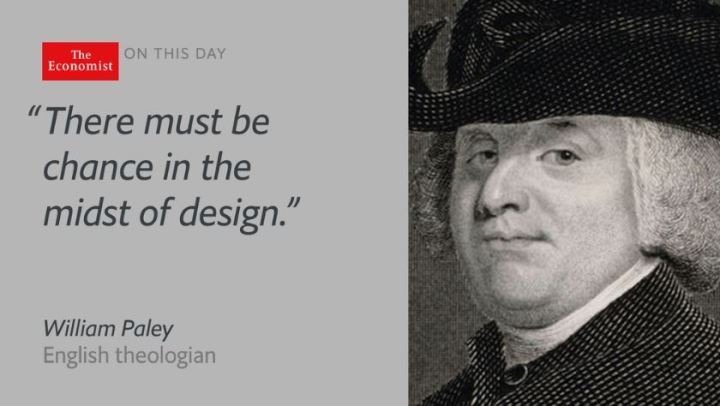Did William Paley really say this?

On 25 May 1805 William Paley died. He is best known for his work “Natural Theology: or, Evidences of the Existence and Attributes of the Deity, Collected from the Appearances of Nature” in which he compared God to a watchmaker. When I found this quote shared on twitter and facebook by The Economist on occasion of the anniversary, I asked: “Did he really say this?” YES. But only as a premise to be contradicted. So, in fact: NO. He did see chance only as an appearance of chance, like the accidental coincidence of two designed events, or chance as the result of the ignorance of the observer. [1]
We should acknowledge that in his time, chance and randomness had not yet the same importance as in our times. He knew nothing about radioactivity or Brownian notion. He did not know about DNA and random mutations.
Stephen Barr in his article “Design in Evolution” explains, that “random” is often used in common to mean “uncaused,” “meaningless,” “inexplicable,” or “pointless” or even “unguided or “unplanned”, but the word “random” as used by biologists, chemists, physicists, and mathematicians in their technical work simply has a different content. [2]
Applied to evolution, we may say: “There is chance in evolution, but this does not mean that evolution happens by chance.”
Would William Paley have liked the idea of an evolutionary process in God’s creation? I have my doubts. His view on God’s action in our world seems too static, too deterministic, too focused on a direct, visible, patent divine intervention.
But several theologians of Charles Darwin’s time came to a positive conclusion. Right Reverend Frederick Temple sounds even enthusiatic:
“The doctrine of Evolution leaves the argument for an intelligent Creator and Governor of the world stronger than it was before. There is still as much as ever the proof of an intelligent purpose pervading all creation. The difference is that the execution of that purpose belongs more to the original act of creation, less to acts of government since. There is more divine foresight, there is less divine interposition; and whatever has been taken from the latter has been added to the former.” [3]
And Cardinal John Henry Newman answered in a letter to a concerned friend:
“As to the Divine Design, is it not an instance of incomprehensibly and infinitely marvelous Wisdom and Design to have given certain laws to matter millions of ages ago, which have surely and precisely worked out, in the long course of those ages, those effects which He from the first proposed. Mr. Darwin’s theory need not then to be atheistical, be it true or not; it may simply be suggesting a larger idea of Divine Prescience and Skill. Perhaps your friend has got a surer clue to guide him than I have, who have never studied the question, and I do not [see] that ‘the accidental evolution of organic beings’ is inconsistent with divine design — It is accidental to us, not to God.”
Did I find The Economist quote by chance? To some degree, yes. I opened my twitter account and it appeared under the first 10 newest tweets. But the tweets I receive are carefully, or designedly, chosen among many possibilities (except the ads, of course). It may be both, chance and design. But I will stop now by design – other duties are waiting.
Notes:
[1] William Paley , Natural Theology or Evidences of the Existence and Attributes of the Deity, 1802
“Natural Theology has ever been pressed with this question: Why, under the regency of a supreme and benevolent Will, should there be, in the world, so much as there is of the appearance of chance? The question in its whole compass lies beyond our reach: but there are not wanting, as in the origin of evil, answers which seem to have considerable weight in particular cases, and also to embrace a considerable number of cases.
1. There must be chance in the midst of design: by which we mean, that events which are not designed, necessarily arise from the pursuit of events which are designed. One man travelling to York, meets another man travelling to London. Their meeting is by chance, is accidental, and so would be called and reckoned, though the journeys which produced the meeting were, both of them, under- taken with design and from deliberation. The meeting, though accidental, was nevertheless hypothetically necessary, (which is the only sort of necessity that is intelligible:) for, if the two journeys were commenced at the time, pursued in the direction, and with the speed, in which and with which they were in fact begun and performed, the meeting could not be avoided. There was not, therefore, the less necessity in it for its being by chance. Again, the encounter might be most unfortunate, though the errands, upon which each party set out upon his journey, were the most innocent or the most laudable. The by effect may be unfavorable, without impeachment of the proper purpose, for the sake of which the train, from the operation of which these consequences ensued, was put in motion. Although no cause acts without a good purpose, accidental consequences, like these, may be either good or bad.
2. The appearance of chance will always bear a proportion to the ignorance of the observer. The cast of a die as regularly follows the laws of motion, as the going of a watch; yet, because we can trace the operation of those laws through the works and movements of the watch, and cannot trace them in the shaking and throwing of the die, (though the laws be the same, and prevail equally in both cases,) we call the turning up of the number of the die chance, the pointing of the index of the watch machinery, order, or by some name which excludes chance. It is the same in those events which depend upon the will of a free and rational agent. The verdict of a jury, the sentence of a judge, the resolution of an assembly, the issue of a contested election, will have more or less of the appearance of chance, might be more or less the subject of a wager, according as we were less or more acquainted with the reasons which influenced the deliberation. The difference resides in the information of the observer, and not in the thing itself; which, in all the cases proposed, proceeds from intelligence, from mind, from counsel, from design.”
[2] Stephen M. Barr, The Design of Evolution, First Things, 2005
[3] Right Reverend Frederick Temple (Lord Bishop of Exeter), The Relations between Religion and Science, 1884
[4] John Henry Newman, Letter to J. Walker of Scarborough, May 22, 1868
